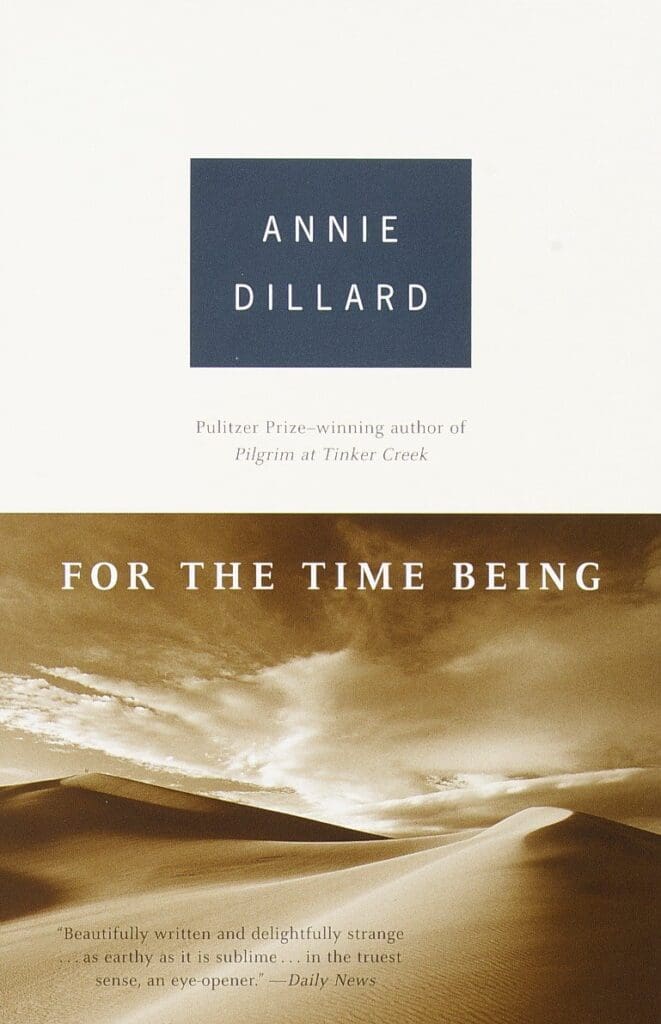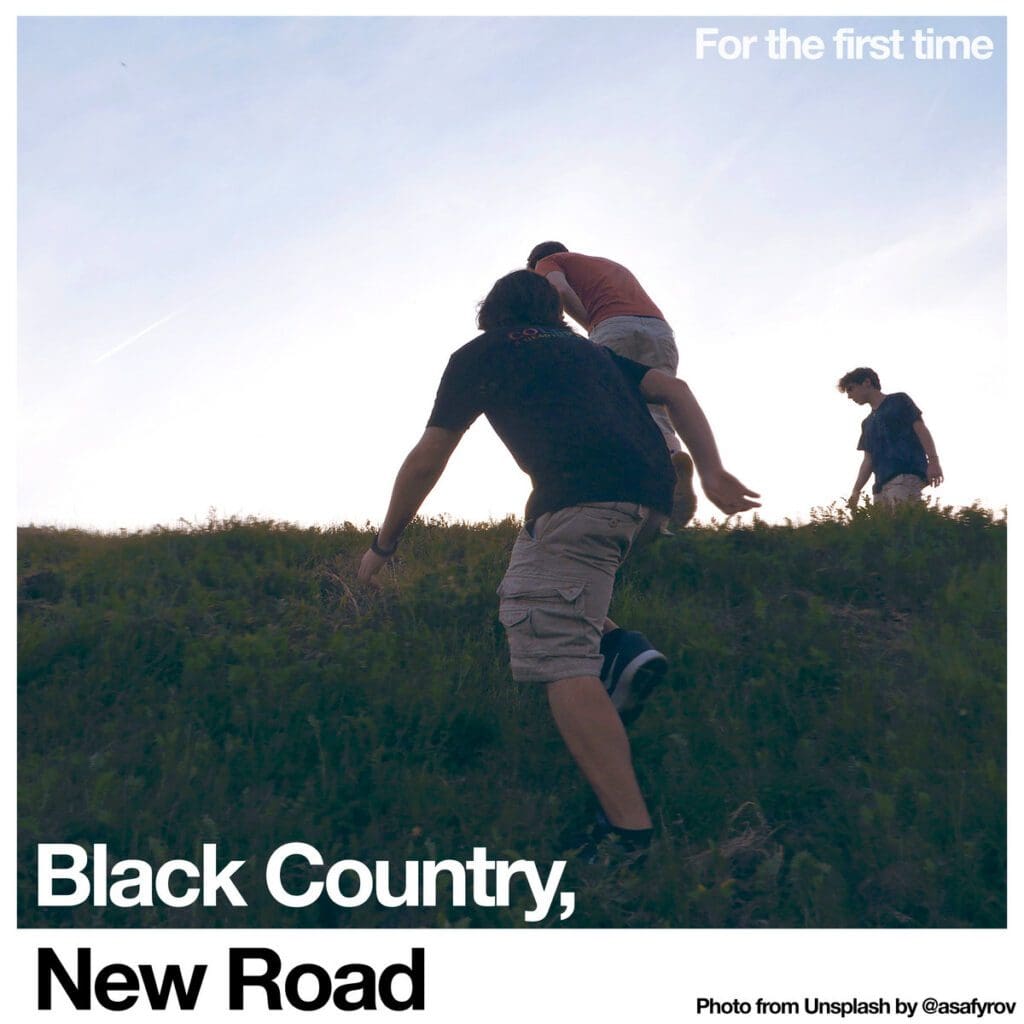
Lily Nilipour, Intern: Throughout the sustained isolation of this pandemic, we have learned much about our personal relationships to each other—to those close to us, to our groups and communities, and to society at large. It has been a time of great tragedy, on many fronts, but we have also seen people come together in extraordinary ways. In searching for ways to process the events of the past year, I have found myself turning to Annie Dillard’s For the Time Being for some wisdom.
For the Time Being is a profound study of a paradox: the importance we place on human life, and our troubled history of trying to eradicate it. Dillard draws on many different anecdotes, sources, biographies, and historical events—epidemics, wars, mass genocides—to weave an incredible tapestry out of this singular question of the individual: “Do we believe the individual is precious, or do we not?” The fragmented form of the text has an equalizing effect; all these pieces of human existence come together to create something bigger than themselves. Dillard thinks about people in just the same way; she respects our instinct toward self-importance, but she also puts our hubris into perspective, asking, “Are we ready to think of all of humanity as a living tree, carrying on splendidly without us?”
In prompting us to consider our individual lives as unimportant, though, Dillard is not giving in to nihilism. Rather, she is emphasizing our place in the vaster organism of humanity—as autonomous beings that also comprise a whole. For the Time Being helps us understand that though we are tiny, especially in the face of global strife, we are still part of something large, and that we can still have impact on others. In these efforts, “sometimes we touch strangers.”

Kyubin Kim, Intern: “Who is Rina Sawayama and why is she the queen of Gen Z TikTok Marxists?” was the question I was asking myself after several videos of self-identified teenage socialists dancing convulsively to the song “XS” popped up in my “For You” page. I never thought I would allow TikTok to shape my music taste, but the one-year anniversary of quarantine is getting to us all, and I have to admit, the bops of this Y2K anti-capitalist anthem were quite good.
Rina Sawayama is a Japanese-British singer-songwriter, who only recently signed onto a label in 2020 after being independent for the past seven years. She is 30-years-old, Cambridge-educated, and a nonconformist. It is difficult to sum up her latest album, SAWAYAMA (2020), in a single sound. There’s the futuristic avant-pop sound of the viral single “XS,” the heavy-metal infused “STFU!” and the rock-with-power vocals-backed-by-a-London-gospel-choir “Who’s Gonna Save U Now?” Like Sawayama’s avant-garde music videos, the album is eclectic, which showcases the transformative range of her breathy vocals, but also allows the songwriter to indulge in concept-driven artistry. And Rina Sawayama had a goal in mind for SAWAYAMA to be the ultimate “family album.”
For Sawayama, there’s a palpable tension in what family means and becomes, and as a member of the Japanese-British diaspora, it tugs from being a loved/hated one. The album’s first song, “Dynasty,” is a rock-inspired entrance into the singer’s intergenerational history: “The pain in my vein is hereditary.” Throughout the album, Rina Sawayama’s inspiration taps into her interviews with her parents, grandparents, and revisiting her Japanese childhood. But beyond biological family, the hit single “Bad Friend” is a confession about the normal falling-out of good friendships, passively watching the breakdown of your chosen bonds (sound familiar in our long-distance quarantine friendships?). And in my current favorite track, “Tokyo Love Hotel,” which I can only describe as champagne-flavored electropop, Sawayama criticizes how the Western world consumes Japanese culture for temporary short-stay love affairs: (“Use you for one night and then away they go”), and her own positionality as a Western artist singing about her Japanese identity: “Thought I was original but after all / I guess this is just another song ’bout Tokyo (Tokyo).” Rina is a socially conscious, self-aware artist who sings her heart out to diaspora, unafraid of making commentary beyond romantic love. As someone so desensitized to the popular music hits we see today, I am enamored with anticipation for which direction Rina Sawayama will challenge the music industry next.
Speaking of revolutionary, thietop comment on the “XS” music video has gone viral: “Rina could write the communist manifesto but Karl Marx couldn’t write XS.” Rina can be Gen Z’s Karl Marx, but Karl Marx will never be Rina Sawayama. As a badass singer-songwriter who rocks orange and blue eyeshadow looks, pink buzzcuts, and unilaterally changes the eligibility rules of British music awards, Rina Sawayama makes it clear that nobody can. But what we can do is listen, follow Rina’s lead, and shake our hips to excess.

Owen Torrey, Intern: For large parts of the past year, I didn’t listen to new music. Whatever the reason behind this fact—perhaps a preference for songs that brought to mind missed people and places—my listening patterns calcified, burrowed beneath a snowbank of old playlists and favorite records. Until, that is, I stumbled across “Opus,” the final track from Black Country, New Road’s debut album For the First Time. Within thirty-seconds, “Opus” took an icepick to my musical hibernation—fracturing it open, letting light in.
Listening to For the First Time for the first time, certain things might sound familiar. Instantly, there are the churning guitars that signal “post-punk,” as well as the drawling, doomy vocals of singer Isaac Wood—straddling the border between spoken and sung. But a peculiar set of lyrical references soon emerges, as Wood alludes to the Cirque du Soleil and Nutribullets, Kanye West and “the best new six-part Danish crime drama.” Then, a sharp violin and careening saxophone swell into a surge of Jewish klezmer music. It’s easy to wonder, as I did, what is this?
This is Black Country, New Road, a band formed in London in 2018 that quickly gained a reputation for their frenetic, crowded live shows. The energy of these sets was sourced from the way each band member—seven of them, all in their early twenties—pushed and amplified one another. (In the concert clips available online, violinist Georgia Ellery and guitarist Luke Mark appear to be in competition to see who can move their fingers fastest; both are winning). On For the First Time, the band draws directly from these live set-lists, miraculously translating each songs’ propulsive friction into recorded form.
“Especially right now during the pandemic,” said the poet Ada Limón last month, “I’m so interested in what abundance looks like.” With their fists full of genres, ideas, and nerve, Black Country, New Road have created an album of true abundance. Whether For the First Time makes you want to dive into a mosh-pit, or link hands in a folk-dance circle, or spin alone in your room, this is an album that moves and makes things move—that is gloriously and entirely new.

Zack Ravas, Editorial Assistant: Despite the fact that she’s been a chart-topping artist for close to a decade now, I’ve only recently become inducted into the cult of Lana Del Rey; but like any new convert, I burn with zeal. Over the course of six albums now (with reportedly another on the way later this year), Lana has carved a niche in pop music that’s entirely her own. At a glance, her image seems to be one of contradictions: she’s sold million of records and cultivated a very specific visual aesthetic, one that draws liberally from past notions of Americana that some might find troubling, and yet to her many fans her music feels like a secret pact made between her and the listener—dark, dreamlike, and intimate.
Her latest is the follow-up to 2019’s Norman Fucking Rockwell!, an album that represented a dramatic expansion of both Lana’s sound and narrative focus. Attempts to pigeonhole the artist as a retro act or ‘all surface, nothing below,’ were utterly refuted by this immaculately produced pop epic, a set of songs that seemed to shed persona after persona until all that was left was unmistakably Lana: “Don’t ask if I’m happy, you know that I’m not/But at best, I can say I’m not sad.”
So yes, Norman Fucking Rockwell! is a tough act to follow. Chemtrails Over the Country Club, out this month, doesn’t quite best it—but it didn’t need to. The record, largely produced by Rockwell collaborator Jack Antioff, continues the reinvention started two years with eleven tracks that enchant and reward multiple plays, from the probable David Lynch homage of “Wild at Heart” to the pure and lovely “Not All Who Wander Are Lost.” It feels the product of an artist who has arrived at a hard-fought destination, one who is totally comfortable in her own skin, even as many of the songs find Lana looking back to a time before music videos and sold out shows: “The thing about bein’ on the road/Is there’s too much time to think/About seasons of old/As you pour yourself a drink.”
If I learned anything from that recent 2 and 1/2 hour long Billie Eilish documentary on Apple TV, The World’s a Little Blurry, it’s that being famous in the age of social media and Coachella looks like a complete and utter bummer. So it comes as less of a surprise that Chemtrails Over the Country Club opens with “White Dress,” not only one of the best songs Lana’s ever written, but a poignant reflection on her life before Born to Die catapulted her to pop stardom in 2012: when she was “a waitress working the night shift” and summer meant “listening to White Stripes when they were white-hot.” After reminiscing about those long gone teenage years, she concludes: “It kinda makes me feel, like maybe I was better off.”
Even the music itself seems to bask in that reminiscence: the stripped down ‘piano and vocals’ quality of “White Dress” recalls Tori Amos’ first few albums from the early Nineties, and Lana sounds unhindered, pushing her voice into a range we haven’t quite heard from her before. But don’t call it nostalgia—Lana isn’t pining for a youth now in the rearview, rather acknowledging how little our current culture nourishes the individual. “I only mention it ’cause it was such a scene,” Lana suggests of those distant days when she was nineteen, “And I felt seen.”
